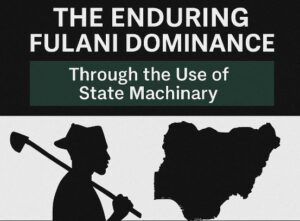

Nigeria is a country with over 250 ethnic groups, different religions, and many cultures. But despite this diversity, one small group has managed to dominate the national space for decades. This group is not the largest by population, nor the richest in natural resources. Yet, through calculated planning, military influence, and political control, the Fulani elite have captured the heart of Nigeria’s public institutions. Today, they continue to use the machinery of the state to maintain a firm grip on power, and it is becoming clearer why they are strongly opposed to any reforms that threaten their hold.
 But to understand how deep this dominance goes, we must look at the two overlapping systems that have shaped Nigeria’s power structure since pre-colonial times. On one hand, there is the Sokoto Caliphate, a traditional Islamic empire established by Usman dan Fodio during the early 1800s. This Caliphate extended across Hausaland and parts of the North Central region. Even today, it still commands religious and cultural authority in those areas, with the Sultan of Sokoto seen as the spiritual head of Muslims in Nigeria. While this system may seem symbolic today, it still plays a major role in shaping opinions and controlling grassroots influence in the North.
But to understand how deep this dominance goes, we must look at the two overlapping systems that have shaped Nigeria’s power structure since pre-colonial times. On one hand, there is the Sokoto Caliphate, a traditional Islamic empire established by Usman dan Fodio during the early 1800s. This Caliphate extended across Hausaland and parts of the North Central region. Even today, it still commands religious and cultural authority in those areas, with the Sultan of Sokoto seen as the spiritual head of Muslims in Nigeria. While this system may seem symbolic today, it still plays a major role in shaping opinions and controlling grassroots influence in the North.
On the other hand, we have the Fulani oligarchy. This is not about religion, but about raw political and economic power. This group includes former military leaders, politicians, top civil servants, and businessmen, mostly of Fulani descent, who have worked together for decades to keep power within their circle. They dominate federal politics and often decide who gets what, who goes where, and who stays out. These people are connected, strategic, and united by a common goal—to keep Nigeria’s power and wealth within their control.
The evidence of their dominance is visible in many federal institutions. From the Nigerian Immigration Service to the Customs, NNPC, the Central Bank, and even INEC, many top placements go to individuals with Fulani ties, even when they’re not competent. This is not just coincidence. It is a calculated move to ensure long-term influence and control. Even in the judiciary and education boards, appointments are made in ways that favor people from the North, especially those close to the ruling elite. This situation makes it difficult for competent Nigerians from other regions to rise to top placements, no matter how brilliant they are.
For years, they have occupied powerful positions in the presidency, military, customs, immigration, and key economic agencies. These positions were not always given based on merit or competence, but often based on ethnic, using the instrumentation of Federal Character policy. As a result, any move to restructure these systems or make them fairer to other Nigerians is quickly seen as a threat to Fulani dominance.
The result of this lopsided arrangement is the steady capture and redistribution of national resources. While oil is found in the South, and taxes are mostly paid in the West and East, federal allocations and key projects are often directed to Northern states. The Fulani oligarchy ensures that subsidies, interventions, and federal contracts flow into their strongholds. In many cases, regions that contribute little to the national purse receive the lion’s share of benefits. This imbalance is one of the major reasons why other regions continue to feel cheated and marginalized.
To make matters worse, this elite group has also captured Nigeria’s security structure. The Army, Air Force, Police, DSS, and other paramilitary agencies have often been headed by individuals from the Fulani bloc. In some periods, all the major security positions were controlled by people from the North. With such control, it becomes easy to suppress dissent, protect allies, and maintain a status quo that favors one group over others. This use of state machinery to hold on to power is dangerous because it promotes ethnic suspicion.
But perhaps the most worrying part of this dominance is the link between this oligarchy and the activities of Boko Haram. Boko Haram started as a local group preaching against Western education, but it quickly turned into a deadly terrorist organization. Its goal is clear—to establish an Islamic state in Nigeria and destroy all forms of secular governance. What is shocking is that, despite the damage Boko Haram has done, including killing Muslims and Christians alike, most Fulani elites, including the sultanate and those aspiring to govern the nation have remained silent or even suspiciously indifferent.
There have been repeated allegations that certain powerful individuals in the North are either supporting Boko Haram or protecting them from defeat. Some former military officers, governors, and traditional rulers have been suspected of shielding the insurgents. In fact, several prominent voices in the country, including past leaders, have said that Boko Haram could not survive without support from within the system. This raises serious concerns about whether the group is being used as a tool for a larger agenda.
This agenda is not new. It dates back to the ambition of Usman dan Fodio, who declared during the Sokoto Jihad that the Qur’an would be dipped into the Atlantic Ocean. That was a symbolic way of saying that Islam would spread from the North to the southern coast. Today, many believe that groups like Boko Haram are being used to revive that ambition—not by preaching or teaching, but by violence, fear, and forced occupation. The silence of Fulani religious and political leaders over these attacks makes it hard to ignore this suspicion.
When religious leaders fail to denounce terrorism clearly and publicly, and when political leaders protect or ignore the sources of violence, people begin to wonder if there is more to it than we are told. This silence has given room for the belief that Boko Haram is not just a group of misguided extremists, but part of a coordinated effort to weaken Nigeria and extend Fulani-Islamic influence across the nation. The targeting of Christian communities in the Middle Belt, the occupation of farmlands by armed herdsmen, and the frequent clashes in places like Benue, Plateau, and Southern Kaduna all seem to fit into a disturbing pattern.
The saddest part of this whole situation is that the victims are not only the people in the South or the Middle Belt. Even many ordinary Northern citizens suffer under this system. Poverty is high in the North. Illiteracy rates are alarming. Infrastructure is weak. While the Fulani elite enjoy power and wealth, the Northern majority live in hardship. This shows that the oligarchy is not working for all Northerners—it is working for a few powerful individuals who use the name and image of the North to enrich themselves and protect their throne.
This system cannot last forever. The world is changing. People are becoming more informed. Nigerians from all ethnic groups are waking up and demanding justice, fairness, and equality. The use of tribal loyalty to cover up incompetence and oppression is being exposed. The younger generation is no longer buying the old narratives of division. They want a country where every citizen, regardless of tribe or religion, has a fair chance to succeed.
The 21st century does not belong to oligarchs and tribal lords. It belongs to people who can compete with ideas, create opportunities, and lead with integrity. The Fulani dominance of Nigeria through the use of state machinery may have lasted for decades, but it is being challenged by truth, data, and courage. A nation of over 200 million people cannot be held hostage by a small group of powerful elites forever.
The time has come to build a Nigeria where leadership is based on competence, not connection. Where public service is a platform for impact, not a reward for tribal loyalty. Where peace and justice are protected by all, not manipulated by a few. The Fulani oligarchy must understand that the winds of change are blowing. They may delay reform, but they cannot stop it. Not in this age. Not anymore.
*Idowu Ephraim Faleye writes from Ado-Ekiti +2348132100608*
